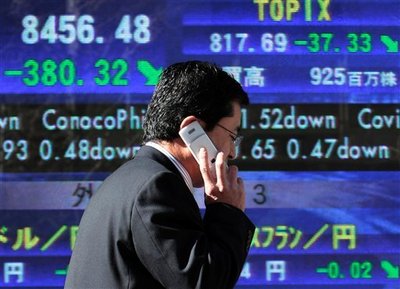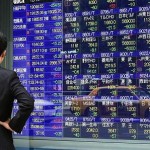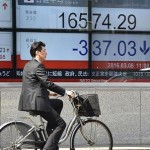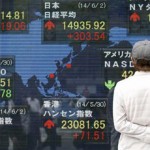Asian Stocks Weighed Down by Earnings as Euro Declines With Oil

-
Crude falls on Russia supply concerns as dollar strengthens
-
Hong Kong’s financial markets shut owing to Typhoon Haima
Asian stocks snapped a three-day winning streak as corporate earnings gave cause for caution and the euro sank to its weakest level since March. Crude oil retreated amid skepticism major producers will limit output.
About eight shares declined for every seven that rose on the MSCI Asia Pacific Index, with Healthscope Ltd. and Keppel Corp. sliding in the wake of results. The euro slipped for a fourth day after the European Central Bank signaled on Thursday that its quantitative-easing program is likely to run past the currently scheduled end-date of March 2017. The yuan fell to a six-year low after China’s central bank weakened its daily reference rate by the most since August. U.S. crude extended losses below $51 a barrel after Russia’s largest oil company said the nation could boost production.

The latest batch of worldwide corporate earnings has presented a mixed picture with lackluster forecasts from Nestle SA and EBay Inc. being countered by upbeat news from companies including Microsoft Corp. and Deutsche Lufthansa AG. ECB President Mario Draghi said Thursday that the authority’s bond-buying program will likely be tapered before it is halted. The hint of an extension to its record stimulus comes as the Federal Reserves weighs the case for its first interest-rate hike of the year, with traders betting a move will come in December.
“There’s no shortage of things that will generate volatility,” said Mark Lister, head of private wealth research at Craigs Investment Partners in Wellington, which manages about $7.2 billion. “But unless something comes out of left field, the Fed will hike in December and that means the economy is on a solid footing and that’s positive.”
Financial markets in Hong Kong are closed Friday as Typhoon Haima lashes the city. Malaysia is scheduled to announce its budget for 2017 and a speech by Fed Bank of San Francisco President John Williams may shed light on the outlook for U.S. monetary policy. Daimler AG, General Electric Co. and McDonald’s Corp. are among companies reporting results.
Stocks
The MSCI Asia Pacific Index fell 0.3 percent as of 2:04 p.m. Tokyo time, trimming this week’s advance to 1.2 percent. Benchmarks in China, India and South Korea declined by less than 0.5 percent. Japanese shares were little changed before the nation’s earnings season ramps up next week, with more than 350 Topix index companies set to report results.
Healthscope plunged as much as 27 percent in Sydney after saying that first-quarter revenue growth at its hospitals unit was slower than expected. Keppel was set for its biggest loss in more than a month after the world’s biggest oil-rig builder announced a drop in profit and more job cuts. Nintendo Co. shares dropped by the most since July after the company’s new Switch gaming platform failed to impress investors. Aluminum Corp. of China Ltd., the country’s second-largest producer, rose 0.5 percent in Shanghai after the company said it swung to a profit in the third quarter.
Futures on the S&P 500 Index were down 0.2 percent. Microsoft surged as much as 6.2 percent in after-hours trading after first-quarter sales and earnings topped analysts’ estimates. Senior executives at AT&T Inc. and Time Warner Inc. have met in recent weeks to discuss various business strategies including a possible merger, according to people familiar with the matter.
Currencies
The Bloomberg Dollar Spot Index added 0.2 percent as the dollar strengthened versus most peers. South Korea’s won was the worst performer among major currencies, sliding 0.8 percent.
The euro dropped as much as 0.3 percent to $1.0896, falling for the first time through the low recorded on June 24, when the outcome of Britain’s vote to leave the European Union was announced. Draghi said Thursday that officials didn’t talk about extending or tapering the institution’s 1.7 trillion-euro ($1.9 trillion) quantitative-easing program. That leaves traders waiting until at least December for news about policy changes.
“It’s a double-whammy from the ECB meeting,” said Matt Simpson, a senior market analyst at ThinkMarkets in Singapore. “Draghi didn’t talk tapering and suggested easing in December. That’s got traders pricing in a weaker euro.”
China’s yuan fell as much as 0.2 percent to 6.7590 per dollar in Shanghai, weakening beyond the 6.75 level that it was forecast to reach by year-end. The onshore yuan has declined in all but one session this month as the People’s Bank of China allowed a drop past the 6.7 level that was previously seen as its line in the sand. In offshore trading, the currency was within 0.5 percent of the weakest level recorded since trading began in 2010.
“The continued dollar strength has weighed on the yuan,” said Andy Ji, a Singapore-based currency strategist at Commonwealth Bank of Australia. “The PBOC won’t fight dollar strength, and it won’t draw a line, at least in the next few weeks.”
Malaysia’s ringgit fell for the first time in four days. Prime Minister Najib Razak will present the government’s budget for next year as he seeks to bolster an economy that’s forecast to expand at the slowest pace in seven years, while sticking to plans to rein in the fiscal deficit.
Commodities
Crude oil fell 0.4 percent to $50.41 a barrel in New York, extending Thursday’s retreat from a 15-month high. Rosneft PJSC Chief Executive Officer Igor Sechin said Russia is capable of a substantial boost to production less than two weeks after President Vladimir Putin pledged his support for international efforts to limit output. Nigeria also said Thursday that it cut the price of every type of crude it sells in an effort to boost its global oil market share.
Aluminum climbed for the first time in six days in London, trimming this week’s loss to 3.3 percent, still the steepest drop in three months. Smelters in China, the world’s biggest producer, boosted output last month to the highest in more than a year, according to data released Wednesday.
Gold was headed for its first weekly gain in four as investors continue to boost holdings in exchange-traded funds backed by the metal. Assets in such funds increased on each of the last seven days to the highest level since June 2013.
Bonds
The yield on benchmark U.S. Treasuries due in a decade fell one basis point to 1.75 percent. It touched a four-month high of 1.81 percent this week as higher oil prices spurred speculation inflation will gather pace.
China’s 10-year bond yield held near a record low, having fallen three basis points this week to 2.66 percent as data showed industrial output missed estimates last month and a weakening yuan spurred concern about capital outflows. That’s two basis points off the lowest level since Bloomberg started compiling ChinaBond data in 2006.
“It’s still a matter of debate whether economic fundamentals have turned better,” said Luo Yunfeng, a fixed-income analyst at Essence Securities Co. in Beijing. “It’s possible that, some time next year, the economy might show some sort of weakness again.”
Source: Bloomberg




























